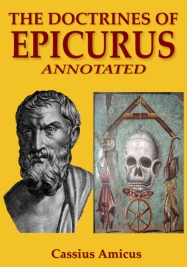The Doctrines of Epicurus – Annotated
 Further reading in DeWitt’s Epicurus and His Philosophy has reminded me that the ancient Epicureans advised that the Principle Doctrines be committed to memory. In order to assist myself in doing that, I have prepared an epub edition of the Doctrines along with reference material for each doctrine from other selections in Epicurean literature. The material here is essentially the same as Chapter 10 of my Ante Oculous – Epicurus and the Evidence-Based Life, but without all the extra material preceding and following it in that volume.
Further reading in DeWitt’s Epicurus and His Philosophy has reminded me that the ancient Epicureans advised that the Principle Doctrines be committed to memory. In order to assist myself in doing that, I have prepared an epub edition of the Doctrines along with reference material for each doctrine from other selections in Epicurean literature. The material here is essentially the same as Chapter 10 of my Ante Oculous – Epicurus and the Evidence-Based Life, but without all the extra material preceding and following it in that volume.
As always, this epub is available for free download by clicking here.
Here is the Introduction:
Bees and wasps must be disturbed only with great care.
When looking over the edge of a canyon, one must not lean too far.
These are simple examples of truths that profit a person to know and to apply, even if one does not understand the reasons behind them. For most people it is not necessary to experience the sting of a bee, or a fall over the side of a cliff, in order to learn the lesson and appreciate the hazard. One need not know the first thing about the anatomy of wasps, or the nature of gravity, to experience a better life by following these prescriptions.
Of such a nature are the Doctrines of Epicurus presented here, which are often referred to as the Principle Doctrines, or the Authorized Doctrines. Each Doctrine is the result of a chain of deductive reasoning that — if applied — will greatly enhance one’s life, especially if one understands the foundation. But no matter how deep or shallow one’s understanding of the proofs behind these doctrines may be, the forty Doctrines of Epicurus which are the focus here constitute truths of Nature which are very useful for happy living if applied.
Modern readers find it natural to expect that in order to be considered authoritative, doctrines such as these must be grounded either on divine revelation, with which they are familiar from religion, or else on some other ground such as academic prestige, tradition, or even political power, with whose claims they are also familiar. The student of these doctrines must understand this clearly: Epicurus claimed no foundation for the validity of his doctrines other than that they are established as true by Nature, and they are validated as true through the faculties which Nature has provided to men.
This current volume was prepared for use of the student of Epicurus who wishes a convenient format to assist in committing these Doctrines to memory, as the ancient Epicureans advised. An unfortunate but unavoidable limitation in this quest is that due to the obstacles of language and time, it is impractical for most to learn ancient Greek and memorize the doctrines in their original form. As a substitute, each doctrine is presented here in modern American English, with alternative translations included for comparison. An important value of this volume is that each doctrine is followed by excerpts from authoritative Epicurean texts which illustrate that doctrine and its application.
It is beyond the scope of this volume to attempt to present the manner in which these doctrines were deduced by Epicurus from the evidence of Nature. The editor advises any serious student of Epicurus to refer to Norman DeWitt’s Epicurus and His Philosophy as the best source for that information. Also recommended are the sources listed in the Additional Reading chapter at the end of this volume. Translations are based on those in the public domain from C. D. Yonge, H. A. J. Munro, and Cyril Bailey.
